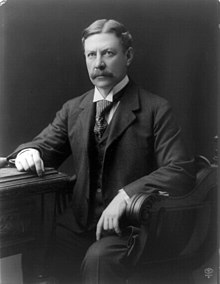William H. Moody
William Henry Moody (born December 23, 1853 in Newbury , Essex County , Massachusetts , † July 2, 1917 in Haverhill , Massachusetts) was an American lawyer and politician who served as Secretary of the Navy and Attorney General in the Cabinet of the United States .
Studies and professional career
Moody completed his school education at Phillips Academy , which he graduated in 1872. He then began to study law at Harvard Law School , where he was a classmate of the future US President Theodore Roosevelt . However, Moody left the university after just four months and continued his studies with the well-known lawyer Richard Henry Dana , which was still possible at that time. Because of this private study, Harvard University awarded him a Bachelor of Laws (LL.B.) in 1876 . After his admission, he worked as a lawyer for some time before he became prosecutor for the city of Haverhill in 1888 .
Just two years later, in 1890, he was appointed District Attorney for Eastern Massachusetts. As such, he became widely known as the Deputy Prosecutor in the famous Lizzie Borden murder case of 1893. In doing so, he earned the reputation of a very competent and eager public prosecutor.
Political career
Congressman
Moody began his political career in November 1895 with the election to the United States House of Representatives . There the Republican represented the interests of the sixth congressional electoral district of Massachusetts until May 1902 . During this time he was a member of the influential House Appropriations Committee .
Minister under President Roosevelt
On May 1, 1902, his college friend and then US President Roosevelt appointed him to his cabinet as successor to Secretary of the Navy John D. Long . He held this office until June 30, 1904. The following day he was by Roosevelt to succeed Philander C. Knox , of the US senator , was appointed Minister of Justice ( Attorney General appointed).
As Minister of Justice, he actively supported the president's pursuit of the unbundling of the large corporations (trusts) through negotiations with the “good” corporations US Steel and charges against “bad” trusts like Standard Oil .
Supreme Court judge
As the appointment of Secretary of War William Howard Taft failed to judge, nominated President Roosevelt instead Moody on 12 December 1906 Richter ( Associate Judge ) at the Supreme Court ( Supreme Court ).
After resigning as Minister of Justice on December 17, 1906, he was appointed judge of the Supreme Court on the same day. As the successor to Henry Billings Brown , he held this office until November 20, 1910. Although Moody's tenure at the Supreme Court was only four years, he was the author of 67 reasons for judgment and five dissenting opinions. His best-known minority opinion was that of the Employers Liability Cases of 1908. In other grounds of the judgment, he interpreted the fifth amendment to the constitution , in which various rights of a defendant are guaranteed in court proceedings and is part of the Bill of Rights .
Due to his poor health, however, he could no longer take part in negotiations of the Supreme Court since May 7, 1909, so that US President William Howard Taft asked him to resign. After Taft had succeeded in ensuring Moody's pension through a "Lex Moody" passed by Congress , although he was neither 70 years old nor ten years a judge, Moody resigned on November 20, 1910 from his judge's office.
After his death, the destroyer USS Moody (DD-277) was named after him.
Web links
General biographical information and monographs
- William H. Moody in the Biographical Directory of the United States Congress (English)
- William H. Moody in the Miller Center of Public Affairs of the University of Virginia (English)
- Biography on the homepage of the Ministry of Justice
- Biography in the New Student's Reference Work, 1914
- Biography in the US legal dictionary
- Judith Rene McDonough: William Henry Moody. Dissertation ( Ph.D. ), Auburn University , 1983
The Lizzie Borden murder case
- The Lizzie Borden Murder Case (German Abstract)
- Russell Aiuto: Lizzie Borden Took An Ax (The Lizzie Borden Murder Case in the Crime Library)
| personal data | |
|---|---|
| SURNAME | Moody, William H. |
| ALTERNATIVE NAMES | Moody, William Henry (full name) |
| BRIEF DESCRIPTION | American politician and lawyer |
| DATE OF BIRTH | December 23, 1853 |
| PLACE OF BIRTH | Newbury , Massachusetts |
| DATE OF DEATH | July 2, 1917 |
| Place of death | Haverhill , Massachusetts |




